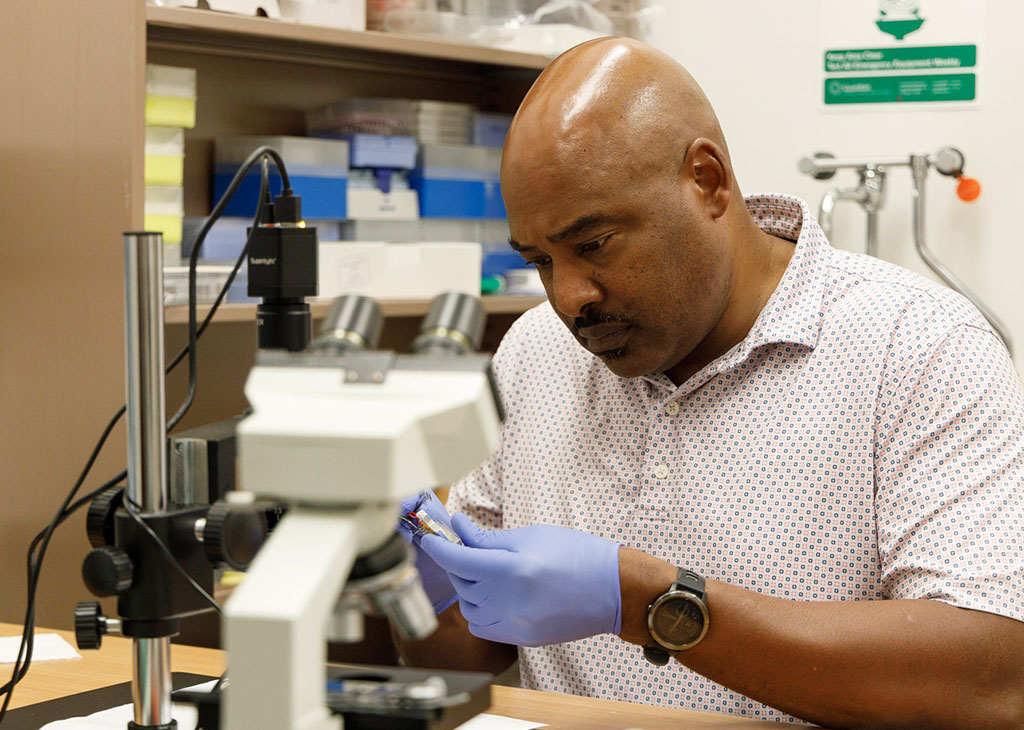Project Aims to Strengthen Pipeline for Black Physicists, Enhance Data Interpretation for X-ray Scattering
Byron Freelon, assistant professor of physics, has been named a Fulbright Scholar for 2024-25, expanding his efforts to promote the representation of Black physicists while building the scientific workforce needed to interpret data produced by X-ray synchrotrons.

“This project involves two lines of collaboration between the United States and Brazil,” Freelon said. “One is a purely scientific network, enhancing the capabilities of the U.S. and Brazilian communities in X-ray scattering data interpretation. The other is to join efforts of Afro Brazilian physicists and Black physicists here to promote the professional well-being of both groups.”
The Fulbright Program, operated by the U.S. State Department, is the government’s main educational exchange program, awarding 1,700 fellowships each year to send U.S. scholars abroad and to bring international scholars here. These prestigious and competitive fellowships provide opportunities to teach and conduct research abroad while establishing long-term relationships between people and nations.
Freelon’s project, which began with a six-week stint in Brazil over the summer and will include a longer stay next spring, ranges from leading workshops to attending technical meetings and conducting research at the Brazilian Synchrotron Light Laboratory in Campinas, Brazil. He’ll host a Brazilian contingent at the National Society of Black Physicists meeting in Houston in November, as well as help Afro Brazilian physicists showcase their work internationally.
The U.S.-Brazil Connection
The synchrotron lab in Campinas highlights the need for this work. “They have just completed this very advanced facility, which produces large amounts of complex data,” Freelon said. “They need people who can interpret this X-ray scattering data. The United States has a similar need.”
The Brazilian synchrotron laboratory allows scientists to investigate the composition and structure of matter in a variety of forms, with applications in fields including materials science – Freelon’s own work involves quantum materials known as 2-dimensional magnets.
Beyond building a network of scientists with the technical ability to interpret that X-ray data, he said circumstances suggest the time is right to strengthen the pipeline for Black physicists on both continents.
“There are a lot of similarities between the two groups, in Brazil and the U.S., although the racism Black physicists face in Brazil is far more rigorous than here, and it’s still fairly rigorous here,” he said. “At the same time, there’s a movement within Brazil to promote opportunities for Black physicists and Black Brazilians in general.” That matters, he said, because excluding Black people from the development of STEM policies limits the ability of countries to solve societal problems, increasing the risk that policies won’t be effective.
Brazil is a good partner for this work in another way, too. Technically considered a developing economy, Freelon said it already has a lot of technical and scientific expertise, and with the new synchrotron X-ray facility, can produce materials science data that requires a sophisticated scientific workforce.
Continuation of Past Advocacy and Research
Freelon long has been involved in efforts to strengthen the STEM pipeline, including work with the National Society of Black Physicists. (He served on the organization’s executive board from 2012-2016.) The work in Brazil is in some ways an outgrowth of that.
“There’s a great need to advance technically and to build collaborations throughout that part of the world,” he said. “I’ve had collaborators in Brazil since 2013. I had been talking with researchers at the synchrotron facility since 2020. That new facility represents an opportunity to strengthen those ties.”
Among its other uses, the synchrotron X-ray facility can aid in the search for quantum materials, a key focus for Freelon’s research group at UH, which uses neutron and X-ray scattering techniques to study the behavior of these materials. The group works on strongly correlated electrons systems and low-dimensional materials.
Next Steps in Brazil and Beyond
The project moves closer to home this fall, as the collaboration will bring a group of Afro Brazilian physicists to the National Society of Black Physicists annual meeting, to be held in Houston in November. The Brazilian scientists, in turn, are planning a conference next summer in Salvador, Brazil, and hope to draw a contingent from the United States.
Freelon will conduct a workshop in Campinas on X-ray scattering data analysis next spring, and he’ll continue to do experiments at the synchrotron facility. Longer term, several Afro Brazilian physicists have applied to do postdoctoral work in Freelon’s lab at UH, while he and collaborators continue to seek grant funding for additional projects. Several Brazilian universities are interested in establishing a formal relationship with UH, including graduate student exchange programs.
“This Fulbright definitely draws on things I’m interested in, things I’ve done in the past related to outreach,” Freelon said. “Bringing those insights, what I’ve learned from that work, to the Brazilians is part of it. And of course, X-ray scattering is a major tool of my research.”
- Jeannie Kever for College of Natural Sciences and Mathematics